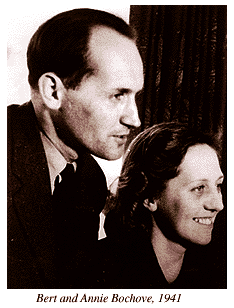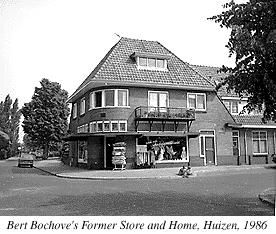 Then you see that your house is more or less the right place for giving help; you have the feeling that you can do a good thing.
Then you see that your house is more or less the right place for giving help; you have the feeling that you can do a good thing.
There must have been at least twenty families involved, maybe more; I knew of about ten or twelve. I think perhaps more people were helping in Huizen because, being so close to Amsterdam, where most of the Jews came from, there was a kind of relationship with many of them. Then too, there was the quality of the people--the most stubborn in their hate against the Nazis--and their orthodox beliefs that the Jews were God's chosen people. They took the Bible literally; I think that had an influence. Personally, I don't believe that a snake has spoken, or things like that, and I don't worry about it, either.
My feeling when doing it, and Annie's too, was that it had nothing to do with religion. If I was not a Christian, I would still do it. You have it in you. The first woman to come to us was a good friend of Annie's, and likeable, the last person you could say no to--it was impossible.
 Then you see that your house is more or less the right place for giving help; you have the feeling that you can do a good thing.
Then you see that your house is more or less the right place for giving help; you have the feeling that you can do a good thing.
Annie never objected, but it was all very hard for her the last months of the war. If your body is not strong, and your system is a bit nervous, if you get very weak and close to being sick, and every time the doctor comes he is worried about you, then you begin to wonder: how long can it go on? You cannot put the people out in the street. So sometimes you cry to get a little bit of relief. That was hard on me. There were days, moments, when it was very hard, but then it would pass, and we went on.
We always had enough to eat but when the war was over I was still quite a bit underweight, about thirty pounds less than my normal weight, and the same for Annie, too. It was from the strain, from all the struggles you go through. The strain was with us day and night, especially after the Germans came to the store that time; we lived with the thought that any day it could happen again. Yet, when I think back, I can see that I have always been an optimist. I can easily remember the good things and forget the rest.
Recently I was talking to a man who said people helped either for money or because they hated the Nazis. I had to say my piece: "Well, hate of the Nazis and money are two different things. You help people because you are human and you see that there is a need. There are people who do it just for the money, which is really terrible, but in the case of someone who badly needed money, well, that was different--I could understand it." I was lucky that I didn't need their money. I was not rich, but the store brought in enough to feed everyone, and I had a good feeling that we could make it with what we had.
If someone, like Meyer, came into my house, who could pay for his food, then fine. Ans and Henny didn't have much, but they were always telling Annie that they wanted to pay something. Annie said, "Take it easy. We don't want your money." At one point Ans sold her piano, and then she was so happy because she could give some money to Annie. Annie kept that money separately, and when it was the Hunger Winter we used it to buy a little extra food.
Liberation: The day that the war was over, I'll never forget it. The air was electric. The news reached everywhere, of course, that the Germans had lost. They signed the peace treaty on the fifth of May, which is still a celebration day in Holland. That morning the Jews in our house decided to go out in the street. It was still not completely safe, but even so, they all went to the little forest where the Sickens and the Juliards were living, to gather fir boughs to decorate the house. I brought down the three thousand Dutch flags from the attic. The first person in the store that morning was the schoolteacher.
"I need some decorations," she said. "Do you have enough paper for us to make about thirty flags?"
Little did she know what she would be getting: real flags! Then, while most of the helpers and the Jewish fellows were busy hanging the flags up all around, more people came in the store. All of a sudden the customers realized that we had had these Jews in the house all the time; it was surprising, but there were still plenty of people who didn't know.
Everyone was busy stringing up wire on the streetlights, hanging flags and candles. There were a lot of people around. By noontime, two German officers on a motorcycle with a sidecar came through the crowd; I don't think they had cars to drive anymore. They stopped in front of the house, and one of the fellows stepped out. Seeing all the people and the decorations, he got mad.
"Break it up!" he yelled.
We didn't do it, of course. They drove off, and we never saw them again. Then the police came by.
"Bochove, don't do it. It's too early."
"Well, can I stop these people?"
I could not stop them. Several people got nervous, but they didn't want to stop.
Before it was night, Huizen's musicians were in the road, marching endlessly through the town, playing the national anthem, with all the kids following behind them. It was tremendous.
A few days later, Pam Juliard brought a sergeant from the English secret service to the house. We asked him if he could find the hiding place. He looked through the whole attic for at least thirty minutes, and couldn't find it. Years later, needing some building materials, I tore out the wall of the hiding place. Then I thought to myself, why did I do that? It was dumb.
In July 1945, two months after Holland's liberation, Annie gave birth to their second child, Marie Louise. Very soon afterwards Annie collapsed with a recurrence of her pre-war tuberculosis. She spent the next two years recuperating in a sanatorium in the Swiss Alps. Hoping to settle their family in the warm, dry climate of southern California, Annie and Bert Bochove, applied early in 1946, to emigrate to the United States. Their papers didn't arrive until July 1949, the same day that Annie died.
 BERT BOCHOVE: In 1980 I was in Holland with my brother and sister-in-law, in Naarden, only twenty minutes away from Huizen. They said, "Let's all go there." Well, I did not have happy times there; I didn't want to go, but they insisted. We drove over, stopping close to the drugstore--only it's not a drugstore now; it's back to being a store that sells knitting wool, the same as before we took it over. My brother took a few photos, then he said he wanted to go inside. I said no. I don't know why, but it was too much for me. I was thinking about how my wife died after we had done all those things. Up until just a short time ago, it was just too much. But now I feel differently. Now that I've told so many stories, that it's being recorded--I think I've aired it out. Now I can see it the way it was.
BERT BOCHOVE: In 1980 I was in Holland with my brother and sister-in-law, in Naarden, only twenty minutes away from Huizen. They said, "Let's all go there." Well, I did not have happy times there; I didn't want to go, but they insisted. We drove over, stopping close to the drugstore--only it's not a drugstore now; it's back to being a store that sells knitting wool, the same as before we took it over. My brother took a few photos, then he said he wanted to go inside. I said no. I don't know why, but it was too much for me. I was thinking about how my wife died after we had done all those things. Up until just a short time ago, it was just too much. But now I feel differently. Now that I've told so many stories, that it's being recorded--I think I've aired it out. Now I can see it the way it was.
Bert Bochove gave this interview in his home in Lomita, California in 1986. He passed away in 1991, at the age of eighty-one.